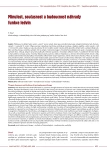Urinary tract infections and chronic renal failure
Authors:
D. Sobotová
Authors‘ workplace:
II. interní klinika Lékařské fakulty MU a FN u sv. Anny v Brně, přednosta prof. MUDr. Miroslav Souček, CSc.
Published in:
Vnitř Lék 2011; 57(7&8): 626-630
Category:
136th internal medicine day, XXIV. Vanýskův den, Brno 2011
Overview
The paper briefly summarizes issues related to urinary tract infections in adults:
predispositions and risk factors, classification, assessment of pathogenicity of bacterial agents, the role of bacteriuria and leucocyturia, interpretation of findings, treatment principles and an association with chronic renal failure. Urinary tract infections are the second most frequent infectious disease in the population. They most often affect women of childbearing potential and then seniors of both sexes who have multiple risk factors. Escherichia coli and Staphylococcus saprophyticus are the most pathogenic towards urinary tract; they are responsible for 85% and 10–15% of cases of acute uncomplicated urinary infections, respectively. Chronic pyelonephritis, a chronic interstitial nephritis, is the fourth most frequent cause of chronic renal failure. Chronic renal failure is a risk factor for the development of urinary infections due to metabolic disorders resulting in secondary immunodeficiency with a disorder of all components of immunity. In patients with chronic renal failure, urinary tract infections occur most frequently after kidney transplantation when graft pyelonephritis is a life-threatening complication. Therefore, urinary tract infection prevention with co-trimoxazole once daily over at least 6 months is recommended in renal allograft recipients.
Key words:
urinary tract infections – pathogenicity of bacterial agents – significant bacteriuria – significant leucocyturia – chronic renal failure – renal transplantation
Sources
1. Horáčková M. Infekce močového traktu u dospělých. In: Teplan V, Horáčková M, Bébrová E et al (eds). Infekce ledvin a močových cest. Praha: Grada Publishing 2004; 63–91.
2. Horáčková M. Infekce močových cest u rizikových nemocných. In: Teplan V, Horáčková M, Bébrová E et al (eds). Infekce ledvin a močových cest. Praha: Grada Publishing 2004; 183–200.
3. Bébrová E. Mikrobiologické aspekty patogeneze infekcí močových cest. In: Teplan V, Horáčková M, Bébrová E et al (eds). Infekce ledvin a močových cest. Praha: Grada Publishing 2004, 31–43.
4. Bartůňková J. Imunitní poruchy u pacientů s chronickým renálním selháním. In: Sulková S et al (eds). Hemodialýza. Praha: Maxdorf 2000 : 432–439.
5. Vanholder R, Van Loo A, Dhondt AM et al. Influence of uraemia and hemodialysis on host defence and infection. Nephrol Dial Transplant 1996; 11 : 593–598.
6. Allon M, Radeva M, Bailey J et al. HEMO Study Group. The spectrum of infection-related morbidity in hospitalized haemodialysis patients. Nephrol Dial Transplant 2005; 20 : 1180–1186.
7. Ponticelli C. New recommendation in the treatment of Gram-positive bacteraemia in dialysis patients. Nephrol Dial Transplant 2008; 23 : 27–32.
8. Teplan V. Problematika nutrice u hemodialyzovaných nemocných. In: Sulková S et al (eds). Hemodialýza. Praha: Maxdorf 2000; 318–384.
9. Kidney Disease: Improving Global Outcomes (KDIGO) Transplant Work Group. KDIGO Clinical Practice Guideline for the Care of Kidney Transplant Recipients. Am J Transplant 2009; 9 (Suppl 3): S59–S62.
10. Nicolle LE, Bradley S, Colgan R et al. Infectious Diseases Society of America; American Society of Nephrology; American Geriatric Society. Infectious Diseases Society of America Guidelines for the diagnosis and treatment of asymptomatic bacteriuria in adults. Clin Infect Dis 2005; 40 : 643–654.
Labels
Diabetology Endocrinology Internal medicineArticle was published in
Internal Medicine

2011 Issue 7&8
-
All articles in this issue
- Biological treatment following renal transplantation
- Immunosuppressive therapy and its problems
- The past, the present and the future of renal replacement therapy
- Aetiology and a clinical picture of chronic renal failure
- Hypertension and cardiovascular complications of chronic renal failure
- Bone disease in chronic renal failure and its modern therapy
- Urinary tract infections and chronic renal failure
- Anemia and chronic kidney failure
- Peritoneal dialysis and its modification in the treatment of chronic renal failure
- Haemodialysis – the current practice
- An overview of the results of renal transplantation in the Czech Republic
- Internal Medicine
- Journal archive
- Current issue
- Online only
- About the journal
Most read in this issue
- Haemodialysis – the current practice
- Anemia and chronic kidney failure
- Immunosuppressive therapy and its problems
- Aetiology and a clinical picture of chronic renal failure
